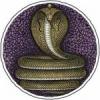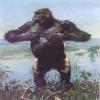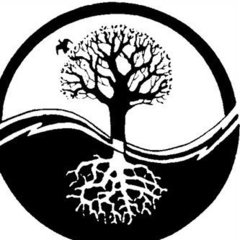Search the Community
Showing results for 'Dream'.
Found 7,590 results
-
Yes, I think that it can be interpreted specifically or generally. It is the things themselves changing, but as the world of life is made up of those things, it is at the same time the world changing. All one big organism. I'm a little confused as to what everyone else believes the story is saying, but no, this is not my contention at all. He's just dreaming. The dream illustrates what it is to die and/or be born; each creature melts into the Great System, and each emerges from it. We are the same, same but different.
-
Xcellent! So the things are reborn indeed. Now lets give it a bit of a thought. Re-born...born again. Same thing is born again. Not one thing dies and a different one is born, but the same. Otherwise its not re-birth. now lets go back to OP and see what Herr Mueller is doing there So, one demerit to Herr M. It must be rebirth of things not changing. His second demerit is for translating 有分 as a distinction. He does not understand that 有分 means 'a chip of the same block' , previously same and now separate. Now the story line of this puzzling fable is complete: Zhou recalls his previous incarnation in a dream because the dream is a magical window on the past. He sees a butterfly as himself yet the butterfly does not have a recollection of being Zhou because it had not happen yet. Then he awakens and remembers him being the butterfly in the past reality, but wonders - was this dream a recollection of Zhou about the past reality OR, perhaps a present reality him being Zhou is a prescient dream of the self-aware butterfly about the future reality? Whatever it is, one thing is certain: whether in a dream or in a reality Zhou is a chip of the old butterfly block or in other words, a rebirth of it, whether in the butterfly's dream or in Zhou's reality...
-
I would like to read this myself, is there a pdf version somewhere out there? Being without job and with less money than i need for basics that would be nice.. and after reading all your comments ( for which i thank you, it made a nice read) i would like to throw in another association popping up. you all seem to be of one mind that it's about change, in whatever way... the dream was of a butterfly, which is an animal that very beautifully shows us the nature of, real transformation.
-
Hehehe. You got it. Nah! And it is true, after a dream, we sometimes slowly regain realization of who we really are. Not the butterfly.
-
It couldve been about death,,using the metaphor of a dream ,,,but he goes back to experiencing himself as Chuang,, reversible death ? Ummm nah.
-
Yes, it is the important part of both that and the Butterfly Dream. Darkstar, you'll have to forgive me...I tend to need to figure things out through discussion etc, but after all that, I realize that I basically agree with Moeller's premise. Though something tells me others won't be so convinced.. Wuhua is well-translated as "the transformation/changing of things", but yes, refers to the cycle of life and death. Whether or not we want to interpret other mentions of wuhua as reincarnation, in this case I don't think we can go so far as to suggest that Zhuang Zhou is being literally reincarnated as a butterfly when he dreams. That would be a little bizarre even for ZZ. 昔者莊周夢為胡蝶 Once, Zhuang Zhou dreamt of being a butterfly,1 栩栩然胡蝶也 Vividly just that, a butterfly, 自喻適志與 Completely at peace with itself, 不知周也 Unaware of Zhuang Zhou.*1 俄然覺則蘧蘧然周也 Suddenly he awoke, and it gradually dawned on him that he was Zhuang Zhou.2 不知周之夢為胡蝶與 He did not know if Zhuang Zhou had dreamt of being a butterfly,*2 胡蝶之夢為周與 Or the butterfly was dreaming of being Zhuang Zhou. 周與胡蝶則必有分矣 Between Zhuang Zhou and a butterfly, there must be a difference! 此之謂物化 This is called the Transformation of Things.3 1 It is explicitly Zhou dreaming, once upon a time, of being a butterfly 2 He comes to this realization slowly -- I am assuming that he remembers, at least in part, his dream, and is a little confused *1 The use of 不知 means that the current subject is unaware of the other -- in this case, the butterfly is unaware of ZZ *2 The current subject is unaware/does not know -- in this case, ZZ does not know whether he is a butterfly or vice versa 3 Or, the Inseparability of Things, or the (Life and) Death of Things, etc
-
A perfect example would be wondering if I was actually a butterfly after awakening from a dream of being a butterfly.
-
I agree totally... except that If there IS a reason to read the stuff, then one has to demystify to understand,, the mystery of mystical is not understanding.,, and Im not as certain the word dream refers to the nightly sleepy alpha wave histrionics. It could be.
-
Sorry ,I think the mysticism not only can be but should be removed , its the only way to give the work its just appreciation IMO. Ill drop out of this. Love these though! Let's look at the text itself, with a loyal (& non-presumptive) multi-choice translation: 昔者莊周夢為胡蝶 once/formerly zhuang zhou dream become butterfly 栩栩然胡蝶也 content understand butterfly 自喻適志與 self explain/understand fit/just will/ideal/remember/consciousness 不知周也 not know zhou 俄然覺則蘧蘧然周也 suddenly awake then leisurely/surprised understand zhou 不知周之夢為胡蝶與 not know zhou dream become butterfly 胡蝶之夢為周與 (or) butterfly dream become zhou 周與胡蝶則必有分矣 zhou and/with butterfly then must have difference 此之謂物化 this is called wuhua But I might add, that last line makes a huge difference and I think giles is greatly flawed to do so.. It clearly resolves the mystical confused reverie aspect ,into a normal consideration of the experience. Understanding , remembering , etc is a situation of personally relating to the past event ,, the forgetting need not be of the facts but rather the first person experience of those facts, and Im thinking we now know what wuhua is.. subjective first person experience.
-
Well, you know.. to someone like me, that sounds like a challenge... Firstly, let me say that I agree about Giles's translation. It is not good. "I" should certainly not be used, and in general it is too specific and presumptive. But Moeller has given us enough to go on as to why Giles's is no good, I think. On to Moeller's own: For sure, no such remembrance is mentioned in the text...but neither is it made clear that ZZ does not remember the dream. If we're talking about a direct, loyal translation, we must not specify either way. Let's look at the text itself, with a loyal (& non-presumptive) multi-choice translation: 昔者莊周夢為胡蝶 once/formerly zhuang zhou dream become butterfly 栩栩然胡蝶也 content understand butterfly 自喻適志與 self explain/understand fit/just will/ideal/remember/consciousness 不知周也 not know zhou 俄然覺則蘧蘧然周也 suddenly awake then leisurely/surprised understand zhou 不知周之夢為胡蝶與 not know zhou dream become butterfly 胡蝶之夢為周與 (or) butterfly dream become zhou 周與胡蝶則必有分矣 zhou and/with butterfly then must have difference 此之謂物化 this is called wuhua For me, 物化 wuhua is important. We cannot claim that either rememberance or forgetfulness are implied in the text; we can only infer. But we can figure out a more precise meaning for wuhua, and see if that helps. Bear in mind that it literally means the changing/transformation of things/stuff: 物 = things (as in wanwu, the ten thousand things) 化 = change, transform, melt, die and it seems to be a contraction of the structure 万物化生 "the ten thousand things die and are (re)born", i.e. the life cycle http://ctext.org/pre-qin-and-han?searchu=%E7%89%A9%E5%8C%96 It comes up a number of times in the Zhuangzi. Let's look at instances where it appears alone as 物化 (not as 万物化生): http://ctext.org/dictionary.pl?if=en&id=2789#s10036103 Here, we might want to read the whole chapter so as not to take it out of context (the speaker is using it to describe action that should not be taken): or, less specifically: Then, from The Way of Heaven: Then, from Ingrained Ideas (using almost the exact same sentence as the previous): Then, from The Full Understanding of Life: wuhua also comes up in the Liezi, Wenzi, and Huainanzi, and some historical and medical texts, but generally in all of these it means "the transformation of things" or the cycle of life and death. Except in that last one, about the artisan Chui. How can one's fingers operate like the cycle of life and death? What ZZ means here, I think, is a seamless, fluid motion; a constant rising and falling; no beginning, only spirit. Just like Cook Ding, Chui is moving with Heaven. 周與胡蝶則必有分矣 Between Zhou and a/the butterfly, there must be a difference/distinction 此之謂物化 This is called wuhua The experience of dreaming is.. dreamy. We often don't know that we're dreaming, and when we wake up we often forget that we dreamt at all. If we do remember, it might be vivid and realistic or fuzzy and fading. Why does ZZ have to be implying total remembrance or total forgetfulness of the dream? And, going back, 俄然覺則蘧蘧然周也 suddenly awake then leisurely/surprised understand zhou The meaning of 蘧蘧 is unclear to me, but I can find no definition of it as "fully and completely" -- more likely, it means "leisurely" or "surprised" In The Revolution of Heaven, implying to me that ZZ's other use of 蘧, in the Butterfly Dream, carries the 'leisurely' connotation rather than 'surprised' So he suddenly awoke, and then leisurely realised that he was Zhuang Zhou. Again, no total remembrance or forgetfulness is implied, I think.
-
Wait as minute. How could Chuang Tzu tell the story of his dreaming if he "has no recollection of his dream"? Remember, Chuang Tzu was a mystic. He would naturally wonder if he really is a human dreaming or a butterfly dreaming. Moeller might be trying to make Chuang Tzu a Materialist. He was not. Also I will mention that Lin Yutang, born and educated in China. Yes, his Father was a Caucasian Christian. Lin was further educated in the West. His translation of the Chuang Tzu is consistent with Giles'. We cannot remove the mysticism from Chuang Tzu.
-
My main motivation for posting Moeller’s interpretation of ‘The Dream of the Butterfly’ was to provide a reference resource for those interested. To my mind, such detailed commentary by a learned researcher schooled in both Eastern and Western thought deserves the widest possible audience. Whilst I welcome comments – and fully appreciate that there are different perspectives on the meaning of the allegory – I don't expect anyone to find flaws with his arguments as presented. His interpretation is the product of much research utilising a network of Chinese and Western academics, and has been peer reviewed by some of the best minds in the field of comparative philosophy. It was first published as an article in the journal Philosophy East and West in 1999 and later in his book Daoism Explained in 2004. The abstract below gives a good outline of his purpose. Zhuangzi's "dream of the butterfly": A Daoist interpretation Hans-Georg Moeller Philosophy East and West 49 (4):439-450 (1999) Abstract: Guo Xiang's (252-312) reading of the famous "Butterfly Dream" passage from the Zhuangzi differs significantly from modern readings, particularly those that follow the Giles translation. Guo Xiang's view is based on the assumption that the character of Zhuang Zhou has no recollection of his dream after awakening and therefore does not entertain doubts about what or who he really is. This leads to a specific understanding of the allegorical and philosophical meaning of the text that stands in contradistinction to most modern interpretations.
-
Our regular waking experience isnt so different, yes some things are based on physical situation, but much is not. Its a dream with some different rules. Why equate the two if not to draw attention to the similarities? Does one not imagine themselves to be what they are,? Is the soldier still a soldier ,when he isnt soldiering? The dreamer, is he still Chuang ,when he isnt ...fulfilling the life of Chuang? We think ourselves constant, a body persisting.. but the body is not exactly the same moment to moment, emotion to emotion, situation variable. I see no need to nail the wording down when the rabbit is caught. Its fine vague, perhaps clearer,since overprecise wording can be quite misleading.
-
Well, I don't want this thread to die so I will speak to it now. First, I will agree with Moeller in that many translations of both the TTC and the Chuang Tzu have been done from a totally Western mind. Also I will add that many translations include the biases of Christianity. To be fair, Giles' translation was one of the first, if not the first, translation of Chuang Tzu into English. There was no attempt to view the text from Chinese mentality. He translated for the Western reader who did not read Chinese. Also, Giles had no other translations to compare his understandings against. But yes, it is true. Translations into English are done with the reader in mind. That would be Western readers. Westerners think like Westerners, not like the Chinese (back then). To the Butterfly story: Burton Watson and Lin Yutang both follow the flow of the story as presented by Giles. This is true of all other translations I have seen. For Moeller to be right every one else has to be wrong. And that would make him the only one right. Sounds suspicious. Note especially in Moeller's translation: Once Zhuang Zhou dreamt—and then he was a butterfly ... That is illogical. We don't become something else just because we are dreaming. I can't speak to any other part of his translation as I do not read Chinese. I do like the flow of Giles' translation over that of Moeller though. And I don't like his last line: This is called: the changing of things. But then, really, I don't like anyone else's either so I can't say much to that. However, it does appear the Moeller is trying to present a translation that has more Chinese "feel" and I give him credit for that. And after all is said, there was a Chuang Tzu for everyone to see and there was a butterfly in a dream and the point is that it is difficult to realize that we are dreaming when we are dreaming, It is only after we wake up that we know we were dreaming. Sadly. there was no butterfly for others to see. Just a dream, Just a dream.
-
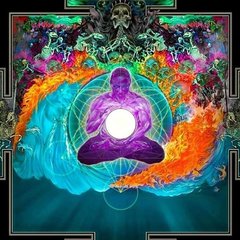
Carefully considering Spring Forest Qigong... but I have a question.
RiverSnake replied to Oneironaut's topic in Systems and Teachers of
No system has a monopoly on any of those. Do you dream? Do you have sex? Do you have the elements present in your body (yes we all do)? Do you have the Jing, Chi and Shen present within your body in order to alchemize yourself spiritually (yes we all do)? Then you can learn how to apply these factors to your spiritual growth. I am absolutely sure that Chunyilin has knowledge of these practices...as you expand your consciousness you naturally begin to understand "things" on a deeper level. It would only make sense that he does since I have some understanding of these things and he's ten times more enlightened than me. Don't be fooled by the idea of "more is better". Often the simpler something is the more powerful it is...but it still requires the years of intense and disciplined study to become skilled....all systems do. Pour your sweat and tears into disciplined daily practice and you will see results.....and also teachers will be more open......even happy.....to teach you things they don't write about on books, because they know you've been busting tail in applying there methods (most people don't put in the effort). On a separate note....I've heard and experienced (some) way to many bad sideffects of toying around with Mantak Chia's stuff. Never played with Michael Winns techniques though. -

Carefully considering Spring Forest Qigong... but I have a question.
Oneironaut posted a topic in Systems and Teachers of
I been looking closely at Spring Forest Qigong due to it's simplicity and the overwhelming number of good reviews it has been getting. I been seeing a lot from master Chunyi Lin on YouTube and he seems like an awesome teacher. Perhaps the absolute best I've seen in my long search for one. Now I see that he introduces Spring Forest Qigong as a medical system and I'm left wondering if this is all it will ever be limited to? Looking at the healing dao systems, promoted by Michael Winn & Mantak Chia, they tend to be super complicated (at least in my opinion) but they expand far beyond medical qigong. You have fusion of five elements, sexual alchemy, higher alchemy formulas & dream practices. Does the healing dao system have a monopoly on all these practices just mentioned? Even if I get into spring forest qigong I do not find it wise to mix different systems together. -
Is the conventional interpretation of the Zhuang Zhou’s Butterfly Dream really a misinterpretation? Hans-Georg Moeller certainly thinks so……… THE DREAM OF THE BUTTERFLY—OR: EVERYTHING IS REAL Herbert A. Giles's translation of the famous allegory of the butterfly dream in the Zhuangzi is beautiful, but unfortunately, as I believe, entirely wrong: Once upon a time, I, Zhuangzi, dreamt I was a butterfly, fluttering hither and thither, to all intents and purposes a butterfly. I was conscious only of following my fancies as a butterfly, and was unconscious of my individuality as a man. Suddenly, I awaked, and there I lay, myself again. Now I do not know whether I was then a man dreaming I was a butterfly, or whether I am now a butterfly, dreaming I am a man. Between a man and a butterfly there is necessarily a barrier. The transition is called Metempsychosis. I quote this translation because of its great influence on the Western perception of Daoist philosophy, especially among Western intellectuals and philosophers. Giles's translation of the Zhuangzi and, in particular, his rendering of this allegory is representative of the general understanding of Daoist philosophy in his generation while, on the other hand, it quite obviously contradicts a traditional interpretation of the text in China. Giles's translation of the butterfly dream has little to do with the original. It is rather an interesting transformation of the text into the patterns of "standard" Western philosophy. Perhaps the butterfly allegory became so popular in the West just because of this "Westernization." When one first reads Giles's version, it surely sounds very Chinese—if only because of the Chinese names and the quite "oriental" butterfly. But upon taking a closer look, it turns out to be an exotic disguise of thoroughly Western ideas. Giles's translation can be compared to the food of many Chinese restaurants in Western countries: it looks Chinese, but the cook has, nevertheless, made it wonderfully palatable to eaters accustomed to the local tastes. Giles's version is based on Zhuangzi's recollection of his dream after he wakes up. Philosophically speaking, the story revolves around a central act of consciousness. Once the philosopher wakes, he remembers his dream of the butterfly, and once he starts remembering this dream, he begins to doubt and reflect on his being and on the problems of truth and appearance. In Giles's rendering, Zhuangzi gains an insight into the continuity of the soul within the chain of existence: he understands that he is part of the great cycle of Metempsychosis or the transmigration of the soul. The act of remembering is at the core of this philosophical realization of the truth. It seems to be the point of departure on the path towards the discovery of the truth about the world and one's soul. Giles's butterfly dream story is an interesting blend of motifs from the Western philosophical tradition. It bears a certain resemblance to the final book of Plato's Republic in which Socrates tells the myth of Er, a person who was allowed to visit the underworld. In the underworld, Er witnessed what happens to the souls there: after their lives on earth, they are judged and sent either to a heaven or to a hell. Having spent a certain amount of time in the underworld, the souls return to earth after choosing a new body for their next life. Before the souls re-enter the world, they have to cross the plains of Lethe—or: Forgetfulness. By this crossing, they lose all their memory of the underworld and go on to live without knowledge of the metempsychosis they have undergone. According to this story, it is only through the act of remembrance—through mentally reaching back before the plains of forgetfulness—that human beings can actually realize their true being and fate: the transmigration of souls. Since Plato, remembrance has been a central motif within Western conceptions of wisdom and knowledge, of thinking and of truth. In Plato's Meno, Socrates tries to prove that all knowledge comes from memory by conducting an "experiment" with an uneducated slave: Just by asking the slave simple yes-or-no questions, Socrates helps him "discover" some basic geometrical rules. He concludes that the slave already had an innate geometrical knowledge and only needed some help to actually remember it. In modern philosophy, G. W. F. Hegel depicted recollection as the way that leads to absolute knowledge in the course of his Phenomenology of Spirit. Old-European philosophers indeed often "thought back" to find the truth. In a similar way, Herbert A. Giles's Zhuangzi has to think back and re-member his dream in order to have the re-flection which leads him to re-cognize what is true and what only seems to be. A second core motif of Giles's butterfly dream story deeply rooted in the Western philosophical tradition is expressed by the most often used term in his translation: I. This I and the related question of what this I truly is make up the philosophical thread that runs through the story. Zhuangzi tells a story about himself, he tells how his I in his dream is the I of a butterfly. Then he awakes and Zhuangzi is, as he says, " myself again. " This very I then starts thinking—and what does it think about? About itself and about what it is! Giles's text is from beginning to end about the I and its reflection on its own being. It is an ironic fact, I believe, that in the history of Western philosophy, there are few texts that treat so exclusively and comprehensively the issue of human subjectivity! A third core motif of Giles's butterfly dream story is doubt. As soon as Zhuangzi remembers his dream, he begins doubting. And again, these doubts are rather existential since they are in regard to his inner self. Did Zhuangzi dream about being a butterfly or is he now a butterfly dreaming he is Zhuangzi? The motif of philosophical doubt is of great importance within the history of Western philosophy. Although Rene Descartes' famous Meditations are usually summarized by the "motto" cogito ergo sum or "I think, therefore I am," one might as well use the motto "I doubt, therefore I am." At least after Descartes, Western philosophers are often seen as experts in doubting, as depicted in Auguste Rodin's sculpture The Thinker. The tradition of Western philosophy has combined these three motifs—remembrance, the being of the "I," and doubt—in various ways. One could very well write a history of (modern) Western philosophy by following the development of these notions. In Giles's translation, Zhuangzi appears to be a paradigmatic Western philosopher in an ancient Chinese robe! A fourth Old-European motif which appears in Giles's butterfly dream comes into play at the end of the story: the motif of the transition of a barrier or transcendence. Once Zhuangzi has realized that there is a border between man and butterfly, he also realizes that he himself as a philosopher can have knowledge of this border and thus that he can philosophically go beyond it. Zhuangzi, by his reflection, can overstep the border between dreaming and being awake, between appearance and truth. This motif alludes to the Western—and especially Judaeo-Christian - distinction between immanence and transcendence. A “meditating” philosopher in the West can mentally reach beyond the barriers of worldly immanence and merely apparent reality. In this way, he or she can move to the higher realm of an infinite, divine, and true world, just like the freed prisoner in Plato's allegory of the cave. A fifth Old-European motif in Giles's butterfly dream is closely connected to the previous one—it is the motif of the unreality or at least the relativity of the world of experience. From the perspective of the "awakened" philosopher, Zhuangzi sees through the unreality of his dreams. What he believed to be true while he was asleep, his then this-worldly and temporally limited existence as a butterfly, is finally unmasked as mere appearance, as a realm of only partial reality. Once the barrier is overcome, then what only seemed to be true is seen as it is. The awakened philosopher looks down on his earlier "unenlightened" experience. Only his mental reflection can elevate him to the realm of truth and free himself from the illusions of dreamlike sensual and temporal experience. In Giles's version, Zhuangzi seems to live through the process of a philosophical transition from the dreamlike phenomenal world to the enlightened realm of the noumenal. The most wonderful transformation of the butterfly dream is, in my view, not the one of Zhuangzi in the story, but rather those performed by Herbert A. Giles. Giles's rendering keeps the oriental surface of the story alive, but completely converts the philosophical content into motifs of the Western philosophical tradition. Giles's magical transformation of the story has been overlooked by many of its Western readers who do not have access to the original texts. If one, however, takes a look at what the text literally says (or rather at what it does not say), and at how its ancient Chinese editor Guo Xiang (252-312) explains its meaning, one will see no evidence of the five motifs discussed above. In the Chinese original, the decisive turning point of the story is not remembering but forgetting. And this forgetting also includes the I and its being—it turns out that there is literally no I and no being in the story. Where Giles introduced doubts in the story, there is doubtlessness in the original, and where he advises the philosopher to transcend barriers, the original advises one to accept borders. Finally, while Giles's story seems to indicate the relativity of the dream world of temporal phenomena, the original text highlights the equivalent reality of all experience. If one reads the butterfly dream story along with Guo Xiang's commentary, one sees the text in a Daoist light. The Crucial difference between the plot of this allegory in Giles's translation and in Guo Xiang's edition is Zhuangzl's reaction when he awakes from his dream. While Giles implies that Zhuangzi remembers his dream, no such remembrance is mentioned in the text, and Guo Xiang's commentary makes it perfectly clear that Zhuangzi does not remember the dream—he has, rather, completely forgotten it. Once Zhuangzi—or as he is called in the story: Zhuang Zhou—awakes, Guo Xiang inserts the following commentary: Now Zhuang Zhou is just as ignorant about the butterfly as the butterfly was ignorant about Zhuang Zhou during the dream. When Zhuang Zhou awakes, he is as unaware of his earlier dream existence as the butterfly in the dream was unaware of Zhuang Zhou's earlier waking existence. Since the plot is completely different, the story has to be read in another manner. This being so, I present my own translation based on the Chinese original and Guo Xiang's commentary: Once Zhuang Zhou dreamt—and then he was a butterfly, a fluttering butterfly, self-content and in accord with its intentions. The butterfly did not know about Zhou. Suddenly it awoke—and then it was fully and completely Zhou. One does not know whether there is a Zhou becoming a butterfly in a dream or whether there is a butterfly becoming a Zhou in a dream. There is a Zhou and there is a butterfly, so there is necessarily a distinction between them. This is called: the changing of things. As opposed to Giles's translation, the original is based upon the mutual ignorance of Zhuang Zhou and the butterfly. The text indicates that because of this mutual ignorance, because of the forgetting of previous dreams while being awake and because of the forgetting of previous periods of being awake while dreaming, there are no grounds for devaluating one phase of existence. Both phases are equally authentic or real because each does not remember the other. Because the butterfly does not know about Zhou, it is "self-content." Because Zhou does not remember his dream he is "fully and completely Zhou"—and without any doubts! Since Zhou and the butterfly do not remember each other, because the barrier between them is not crossed, the change between them is seamless, spontaneous, and natural! The harmonious "changing of things" is dependent upon the acceptance of the distinction and not on its transcendence. In the original version of the text the core philosophical motif of the allegory is not remembering but forgetting. Zhuang Zhou's "state of consciousness" is not one of reflection or theoretical reasoning, but rather one of a man who has been emptied of mental reflection. It is quite noteworthy that the word that most frequently occurs in Giles's rendering—the "I," which is used ten times in those few lines, without counting words like "my" and "myself'— does not appear in the original! With this "I," Giles has Zhuang Zhou narrate the story—which is simply wrong, because it is not told from this perspective. Moreover, the "I" becomes, against textual evidence, the necessary subject of the act of remembrance. In Giles's story Zhuang Zhou becomes "myself again"—there is nothing like this in the Chinese text. While Zhuang Zhou emerges as the "subject" of change in Giles's version—he is first a man, then a butterfly, and then once more a man, there is no continuous subject mentioned in the text. The original text rather implies that instead of an "I" and its "individuality," which undergo change (another invention by Giles), there is a kind of "autonomy" for both the butterfly and Zhuang Zhou. There is, strictly speaking, no substantial "I" that is first awake, then asleep, and then awake again. It is exactly because there is no such single, individual—which literally means in-divisible—I connecting them that both the butterfly and Zhuang Zhou can each be so fully real. They are real because they are divisible, not because they are in-divisible! During the dream, the butterfly is fully the butterfly, and when awake, Zhuang Zhou is fully Zhou. In the original text the change is complete: In one's dream one turns into another full reality and thus one is no longer what one was before. One is no longer "oneself' when change takes place. Change turns one I into another. While in Giles's story there is one I that takes on different bodies (like the soul in the course of metempsychosis), there are three phases in the original text, first Zhuang Zhou awake, then the butterfly in the dream, and then, strictly speaking, another Zhuang Zhou after the dream. There is no continuous I that acts as a bridge between these three phases. This is the reason that all three stages can be equally real. The third motif in Giles's story, the moment of, doubt, also has no equivalent in the Chinese text. Since Zhuang Zhou does not remember his dream, he is totally ignorant about the existence of the butterfly, and so has no reason to doubt his existence. Once awake, Zhuang Zhou is, as the text says, "fully and completely" Zhuang Zhou and does not seem to doubt this fact by asking himself strange philosophical questions. He is not "thinking back," but rather as solidly assured of himself as the butterfly was of itself in the dream. Unlike Giles's version ("Now I do not know whether . . ."), there is no question raised by Zhuang Zhou in the original. In its place the conclusion is made by a "neutral" observer: Given the fact that the butterfly during the dream is as assured of its existence as Zhuang Zhou is of his reality when he is awake, there is no hierarchy of reality for an external observer. There is a reality to the perspective of each phase, so the neutral perspective cannot say that one phase is more authentic than another or that the butterfly is merely a dream. This being so, there can be no doubt that both phases, dreaming and being awake, are in-differently valid. Both phases are indifferent to each other and thus are not differently real. Both phases prove each other's reality. In the Chinese text the reader is left with no doubt about this. The fourth motif in Giles's story finds its reverse in the original Chinese text. Here, it is not the crossing of boundaries that gives rise to "true" reality, but rather the affirmation and acceptance of them. Only if the one who is awake does not "think back" to his or her dreams and only if the dreamer does not "think back" to what he or she was when awake, can they both be "fully real." If, in a dream, one knew that it was a dream, one's dream would no longer be experienced as real. There is no word for "transition" in the Chinese text at all! It is an addition by the translator, just as the ten "I"s are! The reality of both states are dependent on not transgressing the borders of their segments of existence. Just as one is no longer really asleep when one realizes that one is dreaming, one is no longer really awake when one starts "living in a dream world." If one revitalizes earlier phases, for instance by way of recollection, one cannot but give up one's presence, which diminishes the fullness of the "here and now." Total presence and the authenticity of the here and now is necessarily based on the nonviolation of "natural" barriers. Transitions of these barriers will not bring about a higher reality but, on the contrary, take away from reality. As the text says, the changing of things goes along necessarily with distinctions. The Chinese character for "distinction" contains as its main semantic element the character for "knife." Clear-cut distinctions and divisibility guarantee well-proportioned change. It is dangerous to disregard them. In his commentary, Guo Xiang interprets the butterfly story as an allegory about life and death. Guo Xiang explains that just as one should not see dreaming as less real than being awake, one should not see death as less real than life. According to Guo Xiang, life and death are two equally valid phases of being or segments of change. This being so, one should not be anxious about death. If one just lives while being alive without worrying about death, then one can be as "fully and completely" alive as Zhuang Zhou was awake when he did not worry about his dreams. Likewise, when dead, one will not remember life, and therefore the dead can be as self-content and pleased as the butterfly was during the dream. Guo Xiang writes: Well, the course of time does not stop for a moment, and today does not persist in what follows. Thus yesterday's dream changes into a today. How could it be different with the change between life and death!? Why should one let one's heart be made heavy by being moved back and forth between them? Being one, there is no knowledge of the other. Being a butterfly while dreaming is genuine. Relating this to human beings: when alive one does not know whether one may later actually have beautiful concubines. Only the stupid think they really know that life is something delightful and death is something to be sad about. That is what is called "never having heard of the changing of things." It seems that Herbert A. Giles had not "heard of the changing of things." In his version of the story the reader is left with the nonauthenticity of dreams and asked to be ready for a transition of the immanence of life and death. This is not what the ancient Daoist Guo Xiang believed. To him, life and death were equally genuine and no realm of experience was to be devaluated. This contradicts the fifth motif of Giles's version of the story. From a Daoist point of view, the change of something into its opposite is the condition for complete, seamless, and permanent change in general. It is decisive that there are no "bridges of recollection" in this process connecting the phases of change so that each phase can be fully present. This concept of change is illustrated quite drastically by another Daoist parable found in the Huainanzi. This story parallels the butterfly dream, and it goes like this: Once Duke Niuai was suffering from the illness of change. After seven days the change took place and he turned into a tiger. When his elder brother who looked after him came into his chamber to cover the corpse, the tiger caught the elder brother and killed him. A cultivated person had become a predator, claws and teeth transformed. Emotions and the heart had changed. Spirit and form had changed. The one who is now a tiger knows nothing about the one who earlier was a man. And the one who earlier was a man knew nothing about the one who now is a tiger. The two have replaced each other and changed into an opposite. Both were enjoying completeness of form. The transformation of Duke Niuai into a tiger corresponds to Zhuang Zhou's transformation into a butterfly. In both transformations there is total mutual ignorance of the respective phases of existence. Just as the butterfly and Zhuang Zhou were totally ignorant of each other, so too are Duke Nivai and the tiger. This ignorance marks the barrier between the segments of change that is not to be transgressed. Only in this way can all phases enjoy their respective "completeness of form." The opposite nature of human beings and tigers highlights this idea: As a man, Duke Nivai is cultivated, while the tiger, as a predator, is wild. The transformation is total, it includes the "emotions and the heart," and "spirit and form." The phases of change oppose each other like day and night, and therefore they perfectly complement one another and establish an ongoing process. The butterfly dream allegory and the parable of Duke Nivai's "illness of change" both illustrate how an incessant process of change entails complete "forgetfulness." Both stories ask the reader to accept the completeness of change in which there is no continuous "transmigrating" substance. The allegory of the butterfly dream is not about metempsychosis, it is about the Daoist teaching of change. However, if a core element of this Daoist teaching is to forget about previous and future phases of change in order to fully exhaust the authenticity of the one present phase—why does the butterfly dream allegory (as well as the story of Duke Nivai) cover several phases of change? Who can actually tell these stories. What is the perspective of the narrator if neither Zhuang Zhou nor the butterfly have the slightest knowledge of each other? Giles "solved" this problem by inventing the "I" that is not in the Chinese original—and thereby completely transformed the story. In order to correctly answer this important question one has to take a closer look at the first sentence of the original text and the particular way personal names are used in the allegory. The butterfly allegory (as well as the story of Duke Nivai) begins with the word "once" (xi). If the story is told from the perspective of a narrator, this narrator obviously talks about events that happened in the past. The personal names used in the story indicate a similar time relation* between the narrator and the plot: The text is supposedly written by Zhuang-zi, that is by Master Zhuang, the honorific designation of someone who has become a sage. This designation indicates a change in personality—it indicates that someone has changed into someone else. Master Zhuang tells a story about Zhuang Zhou, about a person that was alive before there was Master Zhuang. Zhuang Zhou changed into Master Zhuang, and Master Zhuang tells us a story about events that happened when once there was a Zhuang Zhou. Master Zhuang tells the story about a "Zhou" whom he no longer identifies with. The story is told from the perspective of someone who is neither Zhuang Zhou nor the butterfly, but who is equally "close" to both. From the perspective of the narrator there is no difference in reality or authenticity between the butterfly and Zhuang Zhou. Before there was Master Zhuang, there once was a Zhuang Zhou, and there once was a butterfly. Now, when the story is told by Master Zhuang, he is no longer either of the two. The story is told by someone who does not identify with either Zhuang Zhou or the butterfly, but who affirms both equally. The perspective of Zhuang-zi or Master Zhuang, the narrator, is the perspective of the Daoist sage. The Daoist sage is in the midst of Zhuang Zhou and the butterfly, in the midst of dreaming and being awake, in the midst of life and death. Zhuangzi's perspective is, so to speak, the "zero-perspective." He tells the story out of the empty center of the process of change, out of the axis or the "pivot of Dao" (dao shu) as the same chapter of the Zhuangzi puts it. The Daoist sage dwells unchanged at the center of the process of change. The story is told from this neutral and empty position, not from the position of a continuous I that undergoes change. It is told from the perspective of Zhuangzi, not from the perspective of either Zhuang Zhou or the butterfly. The narrator of the butterfly dream story is a Daoist sage, and this sage, at the "pivot of the Dao" occupies the same position as the hub within a wheel. The butterfly dream allegory in the Zhuangzi is structured parallel to the image of the wheel in chapter 11 of the Daodejing. The image and the allegory both illustrate a perfect process of change. The spokes of the wheel, switching positions in the course of time, correspond to Zhuang Zhou and the butterfly. Just as what is on top changes into what is below, so a Zhuang Zhou changes into a butterfly, a dreamer turns into someone awake, and a Duke Nivai turns into a tiger. Within the process of change each phase is always distinct. The process runs smoothly as long as there is no transgression of barriers, as long as everything does not transcend its respective presence. To the sage at the center of the process of change the segments of change are not only "relatively" authentic—each is fully and completely real. The position of the sage does not introduce a sort of "relativism"; it rather guarantees the full authenticity and completeness of the process of change. Master Zhuang does not take anything away from the reality of either Zhuang Zhou or the butterfly for he affirms and founds their complete reality. Likewise, the Daoist sage does not represent an insight into the "relativity" of life and death, but rather the affirmation of their complete reality. With the Daoist sage, life and death come to their equal and full authenticity. The butterfly dream allegory speaks to both the sage and the nonsage: For those who are not sages, it is appropriate to be fully content with one's reality—to be fully alive without doubting one's "being" or reflecting on one's I. If one is fully awake while being awake and fully asleep while being asleep, one will always be fully present. Like in a political or physical organism, one should just naturally live up to one's position within an ongoing process. If one has become a sage (and the Buddhists will later call this step the attaining of "enlightenment" or wu), if one is no longer either asleep or awake, either alive or dead, one has lost all identifications. One is then equally close to all phases, but never present in any, and nonpresent in the midst of a changing presence. From the zero perspective one observes the spinning of the circle – like Zhuangzi observes the change from Zhuang Zhou to the butterfly. While everything else is what it is, the sage lets it be. In this way the sage can be identified with the whole process of change, just as the hub can be identified with the whole wheel, or the heart with the whole body, or the sage ruler with the whole state. In the midst of changes, the sage is no longer a distinct phase, but the core of the whole process of Dao. From Daoism Explained: From the Dream of the Butterfly to the Fishnet Allegory by Hans-Georg Moeller pp 44-55
-
I have Lakota Indian "Dream Catchers" around the house and they work most of the time.
-
my understanding of it was that the person becomes karmically inoperative, ie they have destroyed the subconscious mind and removed all grounds for negative reactions, no rebirth. they may seem normal at surface level but beneath that all everything flows freely through them without any attachment or aversion. this is the culmination of seeing through things to the extent that the mind recognizes there is no grounds for any type of clinging. from what i can gather, direct perception of impermanence is a big one for relinquishing the last parts of our stuff and seeing into past lives doesn't hurt either. whatever it is it seems to require a great deal of concentration in order to be able to see clearly enough. seeing right through to the basic ground/clear light and cessation of all formations. i was told the awakened experience is like in the clear light dream, which is my only direct point of reference. light is coming out of everything and it seems like the mind is everywhere at once. it probably isn't quite that overwhelming if you're used to it though in terms of teaching, of which i have limited experience, some things seem to ring true at a deeper level. especially as far as transmission goes, with reactions occurring out of nowhere. recognition at a much deeper than intellectual level. these are the kind of things i take away as truths, experiences beyond my understanding, or understanding at all. and then the superpowers. being aware of this type of stuff going on was probably as big a factor as the teaching itself for getting me on the path. not that it means anything by itself, but it certainly demonstrates that enlightenment or attainments/realization are a thing if those kind of things are possible. eg taking other people's minds as objects and being able to place energy there.
-
Thank you I will try to clarify what i wrote, it can be fun trying to express this stuff. There is this danger, yes. Spiritual bypassing maybe? I fell into that trap I think for a number of years. I think the key for me has been the ability to be very honest with myself, and ask 'am I still suffering? Am I still chasing after shit (or avoiding it) in the hope it will make me happy?' (which includes chasing after spiritual shit haha). It depends which 'self' this is in reference to. Is it the ever-changing ego self, or is it the changeless witness of the ever-changing ego self? In the example there is the caterpillarness and butterflyness...but there must have been a part of the caterpillar/butterfly that was aware of and transcended both states, otherwise it wouldn't be the same entity. I don't know this guy or his teaching, but I understand what he's saying. I find it quite helpful the way my teacher differentiates between self realisation and self actualisation. Self realisation is what people generally mean by 'awakening'...the realisation that I am not this ego/body/mind/whatever. This isn't under the control of the mind/ego: you can read or hear the truth a thousand times, but if the mind isn't ready to process or 'get it', if the ground isn't fertile, it simply won't take root. Self realisation or awakening isn't the same as enlightenment/liberation. It's the all-important first step but the realisation can come and go. Self actualisation is the process by which this knowledge is gradually assimilated...whereby it finally sticks! We can have a great many incredible mind-blowing epiphanies, but as soon as we get back to our regular life they tend to go out the window. Self actualisation is making the knowledge stick...ensuring that our thoughts, beliefs, conditioning etc are measured up against this realisation. It's about clearing out the psychological level, bringing our mind and whatever garbage the unconscious is spewing up in line with the truth. This does take time and effort. In vedanta it's called 'nididhyasana', the final stage of realisation. It's about dealing with our residual ignorance, and we all have lifetimes of it. Hardly any teachers out there emphasise or even mention this part of the process, because it would probably put people off. We think it should be effortless, because a lot of us spiritual types can be kinda lazy to be honest, or maybe it's just our instant gratification culture...but it does take some hard graft. It's very rare for lifetimes of ignorance to burn up on the spot (although it can happen if one's mind is suitably prepared and adept at yoga and achieving samadhi, etc). This is very true He doesn't explain what he means by enlightenment here but I agree with the general gist. I agree with this, and that the core reason behind our seeking being a sense of inadequacy. Worldly people look to worldly things to cover up this sense of inadequacy, whereas spiritual people loo for spiritual things to fill that void. This is a step in the right direction but can be a big trap, because we are still looking outside of ourself essentially. As for the teacher, on the level of the person there are no 'perfect people'. It's a terrible mistake to get hung up on a teacher. Nothing is perfect in this level. But to encounter a genuinely liberated being is pretty astounding. On the level of the person they still have their issues like everyone else, they might have health or financial concerns etc, but because they know who they are, nothing knocks them. It's like a rock-solid confidence. It's like they're living in this world, engaging with it, dealing with its inevitable ups and downs, but they don't get hung up on things any more than they would get hung up on the content of a dream at night. It's just a show to them and they genuinely don't get too bothered by it. They don't have any need to chase after anything, because they know that at the ultimate level they are everything. It's amazing to see. And I guess pretty rare.
-
You have beautifully expressed a very interesting, (and clearly heart-felt) point of view. After reading through it, for me there are four main areas where I find my collection of 'satisfying answers' different from your own. I've tinkered with what you wrote purely to highlight those four areas and below I've tried to throw in some hopefully thought-provoking quotes to counterbalance each. For me, I think that unless we're periodically stimulated to consider different thought patterns, my feeling is that whatever 'satisfying answers' we may come up with along our individual spiritual paths - can end up becoming just soothing mantras to keep us comfortably asleep in our dream of spiritual questing. But maybe that's just me. * (1) a quote by Andre Gide : "Know thyself" - a maxim as pernicious as it is odious. Any caterpillar who tried to "know himself" would never become a butterfly. * (2) an extract from a talk by Wayne Liquorman {Q} : Is the awakening gradual or is it sudden, spontaneous, and permanent ? {Wayne} : It is gradual in the sense that your progress to the edge of the cliff is gradual. There may be five steps or five thousand steps taken before you reach the edge, but the last step is always sudden and irrevocable. {Q} : How do you take it ? {Wayne} : “You” don’t. “You” never take the step. It takes you. The ego will not willingly go over, even though it says, “I want to be free from the burden of myself.” It doesn’t really want to be free from the burden of itself, it simply wants to be free of its limitations and those aspects of itself it doesn’t like. * (3) another extract from a talk by W.L. "The event of Awakening is an impersonal event. It happens through a body-mind mechanism, and it can happen in all kinds of ways, and there are probably as many stories as there are body-mind mechanisms through which it has happened. But the impulse is always to focus on the experience, in the secret hope that, “Okay, if we can identify what it was that caused the Awakening, then by diligently applying ourselves to duplicating this feat, we can get what we want !” {Q} : It’s not that,… {Wayne} : It is that, precisely ! {Q} : I was just wondering if your experiencing that emotional turmoil could have been a precursor… {Wayne} : And what I am telling you is that whatever comes before,… it is NOT causative. {Q} : It’s not ? It’s different in each case ? {Wayne} : Yes {Q} : Okay,……So if this Enlightenment is purely a matter of Grace, then why should we seek ? Why should we not just give up ? {Wayne} : Try giving up ! (laughter) You didn’t ask to become a seeker. The seeking started. So you can’t give it up ! It’s the same as having sex with a six hundred pound gorilla,… you’re not done until the gorilla is done. * (4) an extract from a talk by Richard Sylvester One of the problems which arises from our tendency to personalise our fantasy of liberation, is that we can create an idealised image of the guru or teacher. One of the ways in which we keep ourselves seeking is to project onto a teacher an ideal of an ‘enlightened’ person who is so far above us that we can feel we could not reach their state in fewer than twenty lifetimes. We may create an idealised enlightened figure that is above any thought of pain and any possibility of suffering, who lives in utter bliss, who can perform wonderful siddhis and who can release us from our karma if we only show him enough devotion. There can be a powerful tendency to project this idealised figure out there. The more idealised this teacher is, the more our search can be kept going. The search, particularly if it’s for spiritual enlightenment, is sustained by our sense of personal inadequacy. Most spiritual paths are sustained by this thought : “I am not yet good enough but if I follow the guru, repeat the mantra, do enough chanting, clear my chakras and receive darshan enough times, then I will become good enough and one day I will be utterly purified.” All spiritual seeking stems from this core sense that “I am not yet adequate.” Imagining that there is an idealised teacher out there who is 'totally adequate' maintains our sense of inadequacy in comparison. *
-
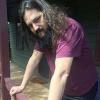
in this world one has to earn the right to know who they are
Seth Ananda replied to MooNiNite's topic in General Discussion
I think that people who think they know themselves, are either quite mistaken, or are incredibly shallow. Sure, some people might ossify into rigid character patterns, and walk around telling themselves and the world that they are a 'meat and potatoes' kind of guy, and that they will never change. In my book that is just knowing the rigid identity that they have settled within. Who knows what may one day shake this certainty delusion. Falling in love. A weird dream that unsettles their whole value system. A child dying or going missing. A psychotic episode or near death experience? Who they thought they were was really a joke, and the further they dig for answers, the deeper and stranger everything becomes. -

Foundations of Internal Alchemy Wang Mu book
voidisyinyang replied to voidisyinyang's topic in Group Studies
thanks for the clarification. So yeah - Saturn makes sense as it's the God of Time - Jupiter protects Earth from comets and asteroids - but sometimes Saturn and Jupiter resonate in their orbits and this resonance energy causes a comet or asteroid to then wipe out all 3-D life on Earth - and without 3-D bifocal vision then our vision lacks the dimension of depth and without dimension of spatial depth we probably also lack the illusion of linear time. So Saturn is very much like Kronos - I think Kronos may have been the god of Saturn and Kronos as Chronos is like Kala (time) as Kali - the destruction and creation of time as a spiral that reverses direction. And so the Earth energy is the "yin qi" energy that is taken in. The Taoist Yoga training does say this "yin qi" energy has to be totally transformed into "yang qi" energy from the yuan qi. the only way that is achieved is through total celibacy. Whereas relying on taking in Earth energy - is also like relying on taking in female jing energy from other humans. This energy is unfortunately not pure since it's a lower emotional energy - whereas to get yang qi you have to achieve "pre-celestial" or "yuan jing" energy - not jing yin qi energy from Earth or females or humans in general. So I would say the reason there are very few - if any real "golden" immortal spiritual masters today is because the Earth and human yin energy is very impure and polluted. For example the Ganges is considered the most spiritual river on Earth and yet it has 1000 times the acceptable level of pollution - as measured at Varanasi - the most spiritual city on the Ganges. For China the Yangtze is also one of the most polluted rivers on Earth and I'm sure the Yellow river isn't doing much better. So to take in the yin qi energy of Earth is not so easy - water is considered the best yin qi energy source from Earth. It is said the magnetic force of Earth used to be much stronger - since the magnetic field changes in strength - but the thing is that electromagnetic pollution is at least 40 times stronger now than 50 years ago - and so to take in the Earth yin qi - it is best to stand barefoot on the Earth - or even better - be buried into the Earth. But you want the bottom of the feet in the Earth as the "yin heel" channel is what builds up the yin qi energy. But you are talking about taking in the yin jing energy through the perineum directly in sitting meditation - and this is from the female yin jing energy - which is from lust and so it's impure. You can take in yin qi energy from Earth directly I'm sure just by sitting on the ground in full lotus - and through the perineum. I have done this also. But as I said - the electromagnetic pollution varies greatly in cities. So a recent study showed that birds lose direction in the cities due to electrosmog - and so just going a couple miles out of the city has much better sense of direction for the birds because animals are very sensitive to having pure yin qi energy from the Earth. You can tell if you take in the Earth's yin qi energy because there is an internal tingling - this is the yin qi neutralizing the internal free radicals. So you can see in this Taoist Yoga training - they say to only let out the yang spirit for a half mile or mile and if it sees another human and animal the golden light spirit body has to immediately return to its original physical body. So it's like a Buddhist manual I read for Mahayana enlightenment - the first prerequisite was to be a least 2 miles from the closest village. So you can see this is a very strict requirement of purification of Earth energy - not just taking in the yin qi energy from the Earth - but purified Earth energy. For example the qigong masters regularly have to clean out "ghost pollution" from a room or area - and it can take several visits. What is ghost pollution - it is yin shen energy that has lower emotional yin qi energy stuck to it - holding the yin shen to earth as a kind of wandering dream state of lower emotional energy. So we modern humans don't realize that ghost pollution is rampant and basically modern humans are actually ghosts - we are just not aware of it. And so the Earth's energy is being killed off - Gurdjieff mentioned this - how the dominant life on Earth has to help the moon spiritual evolve or else the Moon will destroy all life on Earth and start ecology over again. Why? Because the Moon governs the cycles of Yin Qi energy on Earth - through the control of water on Earth. And so how to help the Moon spiritually evolve? By first of all building up and purifying the yin qi energy - as from Yuan Jing energy. So I don't think what you are saying is mutually exclusive. I suppose if we mess up with the Moon's resonance around Earth - that is going to affect the Saturn's resonance with Jupiter and so then a comet or asteroid will destroy all life on Earth - or else just messing up the Moon's resonance will destroy life on Earth. So if we have a whole society out of synch with the Moon's energy then we don't know how to build up the yin qi energy that is purified - as with the Full Moon the meditation is ten times stronger but modern humans are totally out of synch with that. So instead we have electromagnetic pollution that is also destroying all the fresh water on Earth - using it up and polluting it - and the sea levels are rising due to overheating the earth from too much carbon dioxide that is supposed to be sucked up by plants which then transpire fresh water out of their leaves - creating fresh water rain. So yeah it's a good point because Alchemy is based on individualized immortality by storing up the energy individually - and from this arose the Solar Dynasty ritual priest class - the Undead Priests. This arose from mind yoga relying on the left brain and left vagus nerve - the reptilian vagus nerve that controls the heart directly - and so it goes past the heart - and so that's why the priest becomes the Undead. For that ability - also it's based on just infinite logic of mind control but also on total separation from females - no eye contact even - and so it is also very misogynistic. And so no focus on healing abilities of the females. Finally the Undead Priests don't need to show any spiritual abilities - no proof - only need to assert the logical truth of their immortality - as their own secret. So it's a kind of negative proof - everyone else is wrong. And so the secret Solar Dynasty Undead Alchemy Priests - I'm talking about the Brahmin caste but this spread everywhere with "divide and average" mathematics - and so then it relies on a caste system and logarithmic technology that inherently defines infinity through a "contained" materialism - just as the energy is "contained" inside the individual's body. That's what makes alchemy different than just doing healing energy. Of course this is ultimate a lie - that an individual can achieve immortality - because it is only through the infinite formless consciousness that immortality is allowed and this is a totally impersonal energy. So then to say - that only when the golden spirit body looks exactly like the body of the person doing the meditating - otherwise it still has demonic yin qi blockages in it - this is a type of deep exorcism of the person's soul to try to achieve the body's perfection as it was found at puberty I suppose. But the thing is that in the end - what happens to that body? It is pulverized. And so I think pulverized with it is any individualized form - the golden spirit body is made up of qi and shen energy - and it can transform into any physical matter that it chooses to do so. The question is - since it won't reincarnate again - then what physical form will it choose to take? Apparently none since it has just escaped reincarnation. haha. Instead the qi-shen energy is at one with the universe as a whole - unified back into the spacetime source of reality that is eternally creating energy impersonally. You can see how easily this philosophy of individualized immortality would become corrupted into a materialized infinity as logarithmic geometry for modern technology that is destroying the Earth's energy from the resonance with the female Lunar energy. -
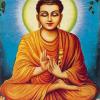
What distinguishes a buddha and a normal enlightened person?
Josama posted a topic in Buddhist Discussion
Hi, I have been wondering what actually distinguishes a Buddha between a normal enlightened person? Is it only a matter of 'amounts of energy' or is more something like a Siddhi of awakening. What I know is that when you do recitation of 'Namo Amituofo', at some point you get a dream of Amitabha Buddha and from then you get that golden ball of light around the head.(which I personally call Buddha Lamp ) So I have been wondering if the transmission of that ball is maybe something unique to Buddhas? Though of course I can't say if this is the case for every mantra. Is it different for others?? -

Foundations of Internal Alchemy Wang Mu book
voidisyinyang replied to voidisyinyang's topic in Group Studies
Right so Wang Mu says that Zhang Boduan doesn't explicit mention the egress of the yang spirit manifestations - but at the same time says that reincarnation will still occur unless this Taoist stage is achieved. And so despite Zhang Boduan being declared a Chan Immortal by the Emperor - that was more for political expediency while in reality Zhang Boduan was really a Taoist immortal. Nevertheless in the spirit of the unity of the three religions Zhang Boduan does focus and emphasize the Emptiness meditation for the final stage of eternal liberation. And so Taoist Yoga makes the similar statements as Zhang Boduan - the "emptiness which is even more empty...." So then by rolling the eyes the Sun and Moon energies unite for the final leap into the Emptiness. So Taoist Yoga also says in this final stage the golden light will emerge out of the head as a golden body but at the same time a demon will also appear for the final test. So if the test is not passed then the person will still have to reincarnate. And so then by uniting the spirit into your heart as the seat of eternal essential nature then finally the "undying self" as the "true spirit" will manifest in front of the person - with the same features as the person. It should only leave the body once a week and in nice weather and during the day. After 6 months - then once every 3 days. After a year - then once a day. All that time the spirit body should be kept close to the physical body. After 2 years the positive spirit physical golden body can leave the meditation grotto during day or night but needs to return to the body to "suck." After 3 years the positive spirit can go to distant places but if it meets another animal or human it has to return immediately to the physical body - so travel just a half mile or so. At this stage the positive spirit has become an Earth-bound immortal. I actually asked the qigong master if he had achieved the "yang spirit" and he said that once when he was in deep meditation in his house in China people saw his physical body outside of his house.... Taoist Yoga says, "you will feel as if coming out a dream and will see another body beside your own." That is what happens when you leave your body. Indeed I did have one brief OBE experience when I fell asleep in full lotus and felt as if someone was on my body - and then I "woke up" from that dream to see my own body in full lotus on the bed. As soon as I saw my own body - from about 15 feet away - I was hovering in the room - then I was sucked back into my own body. Of course what Taoist Yoga is describing is much more powerful. It says at this stage of your physical body leaving - the positive physical golden immortal spirit body - if you have any visions of family or friends just ignore the visions and focus on the Emptiness. The demon vision in the golden light of the physical spirit body is from the remaining left over yin qi energy from the five yin spirit organs. So just keep focusing on the Emptiness and that final yin qi energy will be transformed into the eternal golden body. Only when the features of the golden body are exactly identical to the physical body then the golden body light won't vanish. Meanwhile his own physical body after having absorbed the golden light - it will vanish into the golden vapour. "If he fails to hold onto the golden light his body will fail to evaporate." p. 168 Just hold onto the golden light no matter what and the demons will vanish. But if the student "delights" in the light then the training will end. So traces of yin qi in the golden physical spirit body will cause the demonic visions to manifest and so then the golden spirit light needs to be sucked back into the original physical body in order to purify more the yin qi energy. Chapter 16 At this point the positive golden spirit body can then appear in the world and do mass healings. But then it will eventually re-enter its original physical body for the final breakthrough. At this stage the positive golden physical spirit body is not allowed to leave the original physical body again. The Emptiness is focused on until the original physical body - "until the four elements (that make the body) scatter and space pulverises leaving no traces behind; this is the golden immortal stage of the indestructible diamond-body." Before that stage is reached - the golden light will become "all-embracing, shining on heaven, earth and myriad things which will appear within its light."




